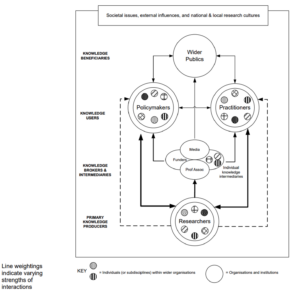Purpose: to provide insight into the knowledge flows that take place between all actors involved in the policy process
For whom: policy makers, administrators, and researchers who want to promote the policy impact of their research
Technique: case study
Type of tool: implementation tool
Prior knowledge: intermediate
Complexity: average
Time investment: days
Downloads
Links
Related tools
What is the Flows of Knowledge Framework?
Policy impact is an important way in which the social sciences and other disciplines can achieve societal impact. However, the impact of research on policy is a complex process that takes place over a long period of time, in which the specific contribution of research findings is difficult to determine, and the expected impact is difficult to predict.
To help fathom this process, the Flows of Knowledge framework provides a conceptual understanding of the key categories of actors, their roles, and the likely flows of knowledge, expertise, and influence between them. In doing so, this tool tries to structure the complex dynamics that underlie the policy impact of research findings.
In the framework, four types of actors are distinguished from bottom to top:
- Knowledge producers: the researchers who produce knowledge
- Knowledge brokers: actors who form the bridge between knowledge producers and knowledge users
- Knowledge users: the actors who actually work with the knowledge
- Knowledge beneficiaries: the actors on whom the use of knowledge should ultimately have an impact
The arrows within the figure indicate the degree and type of interaction. The thicker the line, the more important the relationship is for transferring knowledge. The thickest lines are the lines in which there is a two-way interaction, and the sharing of knowledge is not limited to the sending of knowledge. In addition to the arrows between the organizations, the figure also emphasizes that within the various organizations depicted, there are also different views, backgrounds and experiences that can play a role in the sharing and absorption of knowledge. In addition, the framework emphasizes that knowledge sharing does not only take place through direct interactions between actors, but that this can also take place through intermediaries such as the ‘knowledge brokers’.
Ik heb een beetje moeite met het woord ‘sharing’, want de achterliggende boodschap verschilt met ‘transferring’. Sharing=delen, maar dit garandeert geen tweerichtingsverkeer. Bij overdragen, ‘transferring’, is dit juist wel een meer vanzelfsprekende intentie dan bij delen.

How do you use the Flows of Knowledge Framework?
This framework helps to gain a better understanding of the different knowledge flows that play a role in achieving policy impact. This understanding can then be the starting point for prioritizing or initiating certain interactions.
Because this model was developed in the field of psychology, it is likely that some knowledge actors and streams will be different in the practice of other disciplines. To address this, this framework could be further focused on the context and characteristics of one’s own field. To this end, the developers of this framework have drawn up a questionnaire, which is used in desk study, interviews, surveys, focus groups and case studies. In later versions, the authors build on the framework and arrive at three questions:
- What and who has changed?
- Why and how have changes been made?
- What are the lessons learned for impact identification and generation?
What is the origin of the Flows of Knowledge Framework?
The Flows of Knowledge framework was developed as part of an impact evaluation of projects and grants funded by the UK Economic and Research Council (ESRC) in the field of psychology in the years 1998, 2001 and 2004. The framework was subsequently described in 2008 by Laura Meagher, Catherine Lyall and Sandra Nutley in the journal Research Evaluation. The authors continued to build on this framework in subsequent publications. Parts of this framework have also been applied in the Netherlands for impact evaluations, such as in a case study on NS (Dutch railway company), conducted in 2022 by Margriet, Kim Nguyen and Jorrit Smit of Erasmus University.





